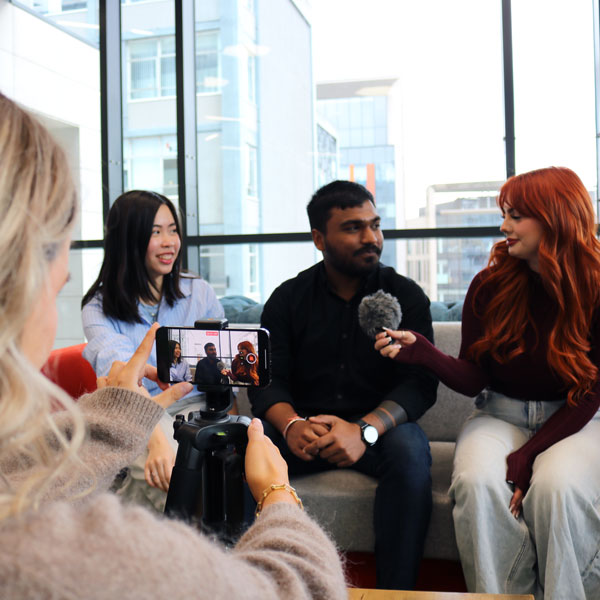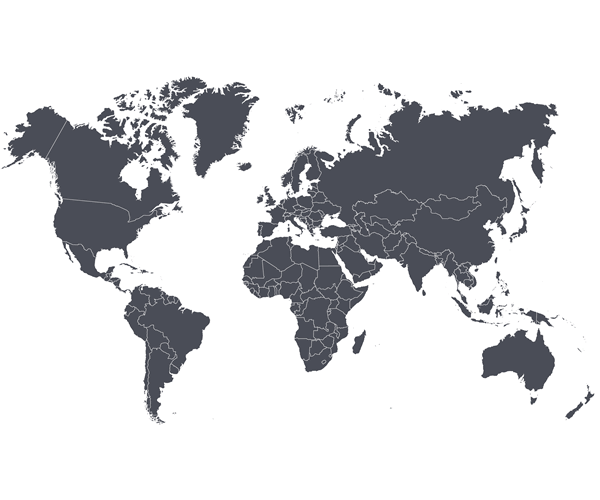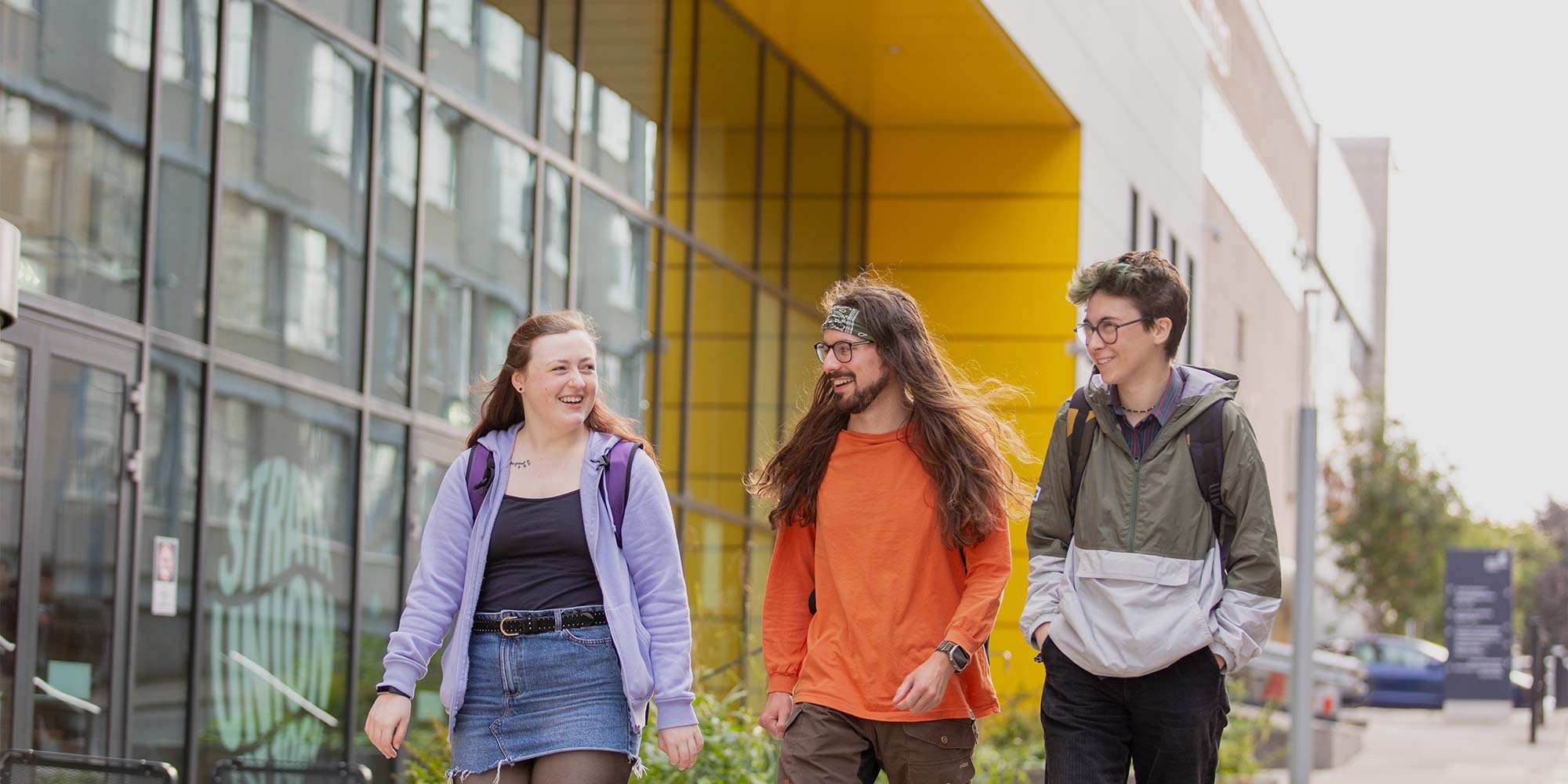MSc/PgDip Digital Journalism
ApplyKey facts
- Start date: September
- Application deadline: 31 August
- Study mode and duration: MSc: 12 months full-time; 24 months part-time
PgDip: 9 months full-time; 21 months part-time Practical module: launch an online publication
Study with us
- gain the skills to produce multimedia news and features
- learn how to devise, launch, produce and market an online publication
- work in the University's simulated news environment and report externally using mobile media
- develop sound analytical, ethical and entrepreneurial skills in order to perform at a high level in the digital media world
The course offers a great amount of practical learning which is not only very useful for my career, but also an enjoyable way to study. The knowledge from taught modules is implemented in our real-life journalism project.
Bagus Saragih, Digital Journalism student from Indonesia
Why this course?
Traditional news outlets are moving towards online products at an accelerated pace.
Digital technology is profoundly changing journalism, with innovations like hyperlocal news and mobile media reporting becoming increasingly prevalent.
We aim to produce high-quality, fresh-thinking graduates who have a passion to communicate and can articulate their ideas through effective story-telling.
You’ll report externally using mobile media and cameras. You’ll have access to industry-standard audio and video editing software. You’ll put together a multimedia portfolio to showcase to prospective employers.


Interested in postgraduate study?
At the Faculty of Humanities and Social Sciences, our friendly and knowledgeable team will be available to provide you with all the information you need to kick-start your postgraduate journey at the University of Strathclyde. Register for upcoming events below:
What you’ll study
The course comprises core and optional classes. MSc students also undertake an academic dissertation or a production dissertation.
You’ll work in the University’s simulated news environment and also report externally using mobile media. This will provide the opportunity to:
- pursue real-life stories
- produce your own journalism packages
- experiment with entrepreneurial projects
- report, write and edit using text, pictures, video and audio to tell multimedia stories effectively
In Semester 2 you will produce a multimedia journalism portfolio incorporating elements of news writing, feature writing and digital and audio production.
In the Entrepreneurial Journalism class, you’ll learn about developing a portfolio career, personal branding and creating new ventures.
Throughout the course, there are opportunities to work on various projects with organisations from journalism and the creative industries.
Industry experience
You’ll have the opportunity to engage with journalists across the spectrum, from local and national news to politics, sports and entertainment, amongst others. You’ll be able to develop your contacts book and gain insight into how to forge a successful career in the industry.
You’ll also have the opportunity to experience working as a journalist, from court reporting to live sports events, to working in a newsroom.
How to become a journalist
With digital technology transforming the media landscape, it's now harder than ever to define a traditional route into the journalism industry.
However, demand remains for skilled, passionate and creative journalists who seek out and craft stories that resonate with audiences. Discover five practical steps aspiring journalists can take to prepare for a career in the media.
Student competitions
Students on the course routinely win nominations and awards in various competitions. In 2015, students won several commendations and awards at the SSJA: commendations for Sports Story of the Year, Multimedia Publication of the Year (for AyeWitness), and News Story of the Year. They also won two awards: News Story of the Year and Scoop of the Year.
In 2016, Maze Magazine won Student Publication of the Year and Multimedia Publication of the Year at the SSJAs.
In 2017, students won two commendations for Feature Story of the Year and the Calum Macdonald Memorial Award and one award for Arts & Entertainment Story of the Year.
In 2018, students were shortlisted for Student of the Year, Feature of the Year, and Mobile Journalism of the Year awards.
Compulsory classes
Multimedia Journalism
This class introduces you to the professional demands of multimedia journalism, equipping you with the techniques needed to create effective digital packages.
You'll learn about:
- news values
- generating ideas and sources
- online research techniques
- interviewing
- mobile media
- creating news
- features
- live blogs
- interactivity
- digital story-telling techniques
- audio/video recording and editing
Digital Media Ethics
This module is designed to give students an understanding of key ethical issues, practices and norms of the digital media environment.
Due to the rapid changes in the digital environment, journalism and wider information media systems have become key sites where normative questions arise about the ethics of these systems, processes and technologies. This includes the interrogation of the tensions between old and new values and traditions in a globally-networked system that has a bearing on individual and collective experience and identity.
This module is for students who wish to learn how to apply theoretical frameworks to complex topics in the digital media environment.
International Media Law
This module will teach students the specific industry legal framework which applies in digital journalism. It will enable students to understand international media law and the application of international media law to digital journalism globally.
Journalism Portfolio
This class enables you to build on the skills learned in Semester 1 and put them towards a comprehensive portfolio which will showcase your skills and abilities to prospective employers.
You will have the opportunity to produce content across a variety of mediums, from news and feature writing to video and podcasts. You’ll be able to make use of professional-level equipment.
Elective classes
Entrepreneurial Journalism and Innovation
This class aims to provide you with the inspiration, mindset and skills you need to create new business ventures, or to prepare for self-managed portfolio careers within the context of the creative industries.
Its purpose is to afford the opportunity for students to develop their entrepreneurial ideas in a risk-free environment.
The class content includes:
- developing an idea
- finding your niche
- technological innovation in journalism
- freelance careers
- new models of journalism
As well as learning new skills, they'll also be able to engage with guest speakers who have forged successful entrepreneurial careers in the media world.
By the end of the course, students will understand some of the key drivers that impact upon the successful creation and management of a new venture where journalism is a core skill, understand the skills and resources needed to create an entrepreneurial organisation, develop an awareness of the requirements of freelance journalism and gain knowledge of innovation in journalism.
Media & Health
This conceptual class explores many of the contradictions and consequences of how health is presented in the media.
The media’s role is to provide both information and entertainment, so we also examine entertainment media and its influence on health education, social norms, and stigmatisation.
After this class, students will understand better how illness and health are presented by the media, what contributes to such representations, and how that affects public attitudes and behaviours.
They will also begin to notice some of the health myths sold through the media and become a more discerning media consumers overall.
They will discover the disciplines of public health, health communication and risk communication and their many complexities.
Last, but not least, students will become better journalists or writers, not just about health, but about people.
Media Analytics
The aim of this class is to provide fundamental data analytics skills to postgraduate students in the media and communication subject area. The class focuses on embracing new analytical capabilities provided by developments in the field of information communication and technology. The Media Analytics module will provide a much-needed set of analytical skills, enabling students to adapt to recent trends in the media and communication landscape.
Communicating Science and the Environment
Concerns about the impact of humankind on the environment and the threat to planetary health caused by unsustainable patterns of production, consumption and management mean that there is a pressing need for this module which explores media, science and the environmental crisis.
This class provides students with a critical overview of key debates regarding science and environmental communications and focuses on how messages are produced, packaged, and circulated for diverse audiences with examples drawn from legacy media and contemporary social media platforms.
Students will thus gain an understanding of overarching theoretical approaches to science and the environment from the cross-cutting fields of Sociology of media; cultural studies; feminist research; critical race research and science and technology studies.
We will examine reporting of the climate emergency; analyse framing of microplastics in the media, explore the role of celebrities in shaping environmental campaigns and deconstruct assumptions about what constitutes ‘pollution’.
The module is assessed by an academic essay and a short blog post.
Communication & Media Theory in an International Context
This class offers advanced study of the dominant media and communication theories, and their application across a number of international contexts and media platforms. As well as discussing a number of traditions in communication research, the class will reflect critically on trends and texts across a number of media contexts and genres, including popular cultural platforms and the coverage of politics. The class will also look to the implications of international media on the mediation and public understanding of international coverage of conflict and terrorism.
Strategic Communication
This class will acquaint you with the field of strategic communication and the major theories of persuasion. It will explore the process of communicating purposefully from its different stages and thus help you form a well-rounded theoretical understanding of its many facets and complexities. The class will also combine theory and practice by asking you to apply the acquired theoretical perspectives onto professional scenarios.
If you progress to the MSc, you'll choose to undertake either an academic dissertation or a production dissertation.
Academic Dissertation
This allows you to explore a journalism studies topic at length through robust research methods and analysis.
Suitable subjects include:
- journalism ethics
- the media’s institutional and financial frameworks
- the practice of journalism including textual usage, social media and media effects
- journalism’s social context
Production Dissertation
The production dissertation enables you to investigate and produce a piece, or a series of pieces, of original digital journalism at length. You will create a substantial multimedia artefact/project of your own work that demonstrates high quality journalism skills and technical proficiency. You will utilise a range of appropriate story-telling platforms e.g. online, audio, video, photography, interactivity, captions and graphics in order to effectively interpret your chosen subject.
Learning & teaching
The course is delivered by lectures and seminars, during which a range of teaching and learning strategies are used. These include formal talks, discussions, presentations, role-playing exercises and discussion of recorded material.
You'll also pursue real-life stories, produce your own journalism packages and experiment with entrepreneurial projects in extended workshops. You'll devise, launch and produce your own online publications predominantly through independent learning.
Assessment
Assessment methods vary according to the nature of the class.
Academic subjects are generally assessed by written essays, case studies and presentations.
In the Media Ethics class, students complete an innovative assessment, which requires them to work together in groups to research, create and produce a short video that explores a journalism ethics topic.
In practical journalism classes, students produce individual multimedia journalism packages, portfolios of their own work and a group online news site.
Peer assessment is also used in some of these classes.

Taylor McDaniel, United States
I really enjoy how practical and useful my programme has been so far. We're not just learning theory, we're doing hands on journalism creation and production. This is not only very helpful for future career prospects, it's really fun too!

Abheet Raghav, India
My experience so far at the University of Strathclyde has been beyond satisfactory in the challenging circumstances due to COVID-19. Despite so many restrictions, the university left no page unturned when it comes to providing an efficient learning experience along with inviting a range of guest lecturers. This certainly has been the highlight for me.
Chat to a student ambassador
If you want to know more about what it’s like to be a Humanities & Social Sciences student at the University of Strathclyde, a selection of our current students are here to help!
Our Unibuddy ambassadors can answer all the questions you might have about courses and studying at Strathclyde, along with offering insight into their experiences of life in Glasgow and Scotland.
Entry requirements
| Academic requirements | Honours degree, or overseas equivalent, or professional experience demonstrating ability to study at Masters level. Experience of student journalism, a media work placement, freelance work or professional journalism is desirable. |
|---|---|
| English language requirements | Please check our English requirements before making your application. |
Pre-Masters preparation course
The Pre-Masters Programme is a preparation course held at the University of Strathclyde International Study Centre, for international students (non-UK/Ireland) who do not meet the academic entry requirements for a Masters degree at University of Strathclyde.
Upon successful completion, you'll be able to progress to this degree course at the University of Strathclyde.
International students
We've a thriving international community with students coming here to study from over 140 countries across the world. Find out all you need to know about studying in Glasgow at Strathclyde and hear from students about their experiences.

Fees & funding
All fees quoted are for full-time courses and per academic year unless stated otherwise. Please note second year will be subject to increases.
Fees may be subject to updates to maintain accuracy. Tuition fees will be notified in your offer letter.
All fees are in £ sterling, unless otherwise stated, and may be subject to revision.
Annual revision of fees
Students on programmes of study of more than one year (or studying standalone modules) should be aware that the majority of fees will increase annually. The University will take a range of factors into account, including, but not limited to, UK inflation, changes in delivery costs and changes in Scottish and/or UK Government funding. Changes in fees will be published on the University website in October each year for the following year of study and any annual increase will be capped at a maximum of 10% per year.
| Republic of Ireland |
If you are an Irish citizen and have been ordinary resident in the Republic of Ireland for the three years prior to the relevant date, and will be coming to Scotland for Educational purposes only, you will meet the criteria of England, Wales & Northern Ireland fee status. For more information and advice on tuition fee status, you can visit the UKCISA - International student advice and guidance - Scotland: fee status webpage. Find out more about the University of Strathclyde's fee assessments process. |
|---|---|
| Scotland, England, Wales, Northern Ireland & Ireland | MSc:
PgDip: £6,367 *Please note Year 2 fee will be subject to an increase |
| International |
|
| Available scholarships | Take a look at our scholarships search for funding opportunities. |
| Additional costs | International students may have associated visa and immigration costs. Please see student visa guidance for more information. |
Please note: the fees shown are annual and may be subject to an increase each year. Find out more about fees.
How can I fund my course?
Scottish postgraduate students
Scottish postgraduate students may be able to apply for support from the Student Awards Agency Scotland (SAAS). The support is in the form of a tuition fee loan and for eligible students, a living cost loan. Find out more about the support and how to apply.
Don’t forget to check our scholarship search for more help with fees and funding.
Students coming from England
Students ordinarily resident in England may be to apply for postgraduate support from Student Finance England. The support is a loan of up to £10,280 which can be used for both tuition fees and living costs. Find out more about the support and how to apply.
Don’t forget to check our scholarship search for more help with fees and funding.
Students coming from Wales
Students ordinarily resident in Wales may be to apply for postgraduate support from Student Finance Wales. The support is a loan of up to £10,280 which can be used for both tuition fees and living costs. Find out more about the support and how to apply.
Don’t forget to check our scholarship search for more help with fees and funding.
Students coming from Northern Ireland
Postgraduate students who are ordinarily resident in Northern Ireland may be able to apply for support from Student Finance Northern Ireland. The support is a tuition fee loan of up to £5,500. Find out more about the support and how to apply.
Don’t forget to check our scholarship search for more help with fees and funding.
International students
We've a large range of scholarships available to help you fund your studies. Check our scholarship search for more help with fees and funding.
Faculty of Humanities & Social Sciences Scholarships
EU Engagement Scholarships are available to EU applicants who would have previously been eligible for Home (Scottish/EU) fee status.
Careers
Graduates of the course are employed at organisations such as:
- the Herald and Times Group
- the Press and Journal (Aberdeen)
- BBC
- STV
- DC Thomson
- the Daily Record
as well as running their own entrepreneurial ventures such as JournoWave.
Job roles include:
- magazine journalist
- magazine features editor
- newspaper journalist
- newspaper digital editor
- freelance journalist
- online journalist
- digital copywriter
- digital content creator
- digital content editor
- social media manager
- communications officer
- public relations officer
- researcher for a broadcast organisation
Glasgow is Scotland's biggest & most cosmopolitan city
Our campus is based right in the very heart of Glasgow. We're in the city centre, next to the Merchant City, both of which are great locations for sightseeing, shopping and socialising alongside your studies.
Apply
Start date: Sep 2025
Digital Journalism
Start date: Sep 2025
Digital Journalism
Start date: Sep 2025
Digital Journalism
Start date: Sep 2025
Digital Journalism
Contact us
Prospective student enquiries
Contact a member of our team on LiveChat between 10am and 4pm (GMT)
Telephone: +44 (0) 141 444 8600
Have you considered?
We've a range of postgraduate taught and Masters courses similar to this one which may also be of interest.

